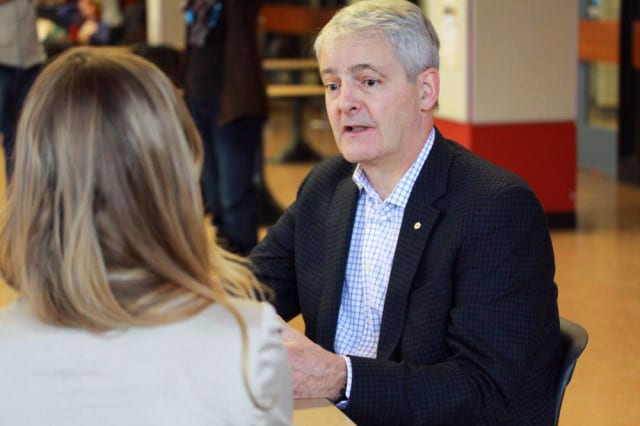STEPHANIE ARDELL

Marc Garneau, the first Canadian ever to go to space, chats with students in the Education Building during a recent visit to campus.
Astronaut-turned-politician Marc Garneau made a campaign pit stop on campus Jan. 11.
Garneau, who’s in the race for leader of the Liberal Party, lunched and chatted with students and supporters in the Education Building.
Garneau has an impressive and unusual resume.
The Quebec native graduated from the Royal Military College of Canada with a bachelor’s degree in engineering physics before heading to London, England to pick up a PhD in electrical engineering from the Imperial College of Science and Technology.
He went on to join the Royal Canadian Navy as a combat systems engineer and spent the next fifteen years climbing the ranks, before retiring in 1989 as a Naval Captain.
In 1984, Garneau was selected as one of six Canadians to become a part of Canada’s astronaut program and in October of that year became the very first Canadian in space.
Garneau stayed on with the Canadian Space Agency, Canada’s equivalent to NASA, eventually becoming the president of the federal agency. He returned to the sky in 1996 and again in 2000 for another look, chalking up well over 600 hours above the Earth, which he has now circled hundreds of times.
Soon he would make the leap into politics.
“Well eventually you have to come back down to earth,” Garneau says with a chuckle before recounting how the Canadian prime minister at the time, Paul Martin, had approached him to see if he had any interest in running for office.
Garneau decided to run and is currently in his fifth year as an elected member of parliament in Ontario’s Westmount Ville-Marie riding.
His track record, especially in leadership positions, is part of the reason Garneau believes he is a good candidate to head up the Liberals.
“It takes someone strong who can remain calm and reassuring in crisis. I think I’ve demonstrated that in the responsibilities throughout my life,” Garneau said.
While parliament tends to be saturated with members boasting law degrees, Garneau believes that his background in the sciences will allow him to bring forward a new perspective.
Having been a student for many years himself, Garneau understands well enough the difficulty of finding a job and starting your life with the weight of student debt looming ominously over your shoulder. He plans to instate policies that ensure a less financially burdensome route for students in the future, as well as incentives for businesses to hire young Canadians and give them career experience in order to broaden their horizons. He believes enabling youth is the first step to that future.
“Wilfrid Laurier is famous for saying that the 20th Century was going to be Canada’s, but he was off by a century.
“The prospects for Canada are very bright for the future,” Garneau said.
Another facet of Garneau’s platform that could rally college kids is his stance on the longstanding debate over marijuana.
“I am in favour of decriminalizing and legalizing as well as regulating marijuana,” Garneau said, “It is a substance that has to be treated seriously, like alcohol.”
As a person of science, he is aware of the “permanent cognitive development consequences” that can result from abuse of marijuana, particularly in the teenage years, and believes that the power to regulate the drug could be the solution. Garneau is concerned with the impact it might have on Canada’s southern neighbors as well.
“I would be sure to check one thing first though. I would not want [legalization] to slow down flow of trade with the United States. Though they are beginning to think that way, they are not quite there with Canada yet and we would not want them to view the border as a place where there could be a lot of trafficking.”
Garneau will be keeping busy with a series of debates and appearances throughout the country in the next two months leading up to the announcement of the new Liberal leader on April 14.
—
Photo: Jordan Dumba/Flickr